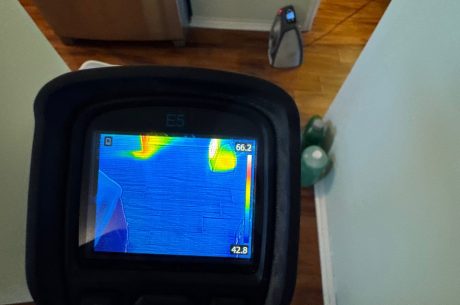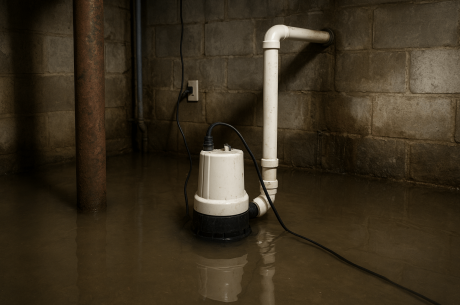Basements are valuable spaces in many Ann Arbor homes—used for storage, recreation, or even extra living areas. But with Michigan’s unpredictable weather, snowmelt, and frequent rainstorms, keeping your basement dry is more than a convenience—it’s essential for protecting your home’s structural integrity and indoor air quality. Water damage can occur quickly, and in many cases, it begins with a poorly maintained or improperly waterproofed basement. In this guide, we’ll break down the most effective basement waterproofing strategies, the difference between interior and exterior systems, and how regular maintenance can prevent costly problems before they start.

Table of Contents
Why Waterproofing Matters in Ann Arbor
Ann Arbor’s climate includes cold winters with snow accumulation and wet springs with substantial rainfall. When snow melts or rainwater pools around your foundation, your basement is at risk for flooding, moisture seepage, and mold growth. Local soil composition also plays a role—clay-heavy soils, which are common in the area, retain water and can put additional pressure on your foundation walls.
Without proper waterproofing, moisture can:
- Weaken your foundation
- Encourage mold and mildew
- Damage stored belongings
- Affect indoor air quality
- Lower your property value
That’s why proactive basement waterproofing is a must for homeowners throughout Ann Arbor and surrounding areas like Ypsilanti, Saline, and Dexter.
Interior vs. Exterior Basement Waterproofing: What’s the Difference?
There are two primary approaches to keeping basements dry: interior and exterior waterproofing. Each method has its strengths and is suited to different types of water intrusion issues.
Interior Waterproofing
Interior waterproofing focuses on managing water that has already entered your basement or is seeping through foundation walls.
Key features include:
- Interior drainage systems (like perimeter channels or French drains inside the basement floor)
- Sump pumps to collect and discharge water
- Vapor barriers applied to interior walls
- Sealants and waterproof coatings to prevent seepage
Best for: Homes dealing with condensation, minor seepage, or water that enters through cracks or the cove joint (where the wall meets the floor).
Benefits:
- Less invasive than exterior work
- More affordable for most homeowners
- Faster installation
Exterior Waterproofing
Exterior waterproofing addresses the problem at its source—preventing water from reaching your foundation in the first place.
Key features include:
- Excavating around the foundation
- Applying waterproof membranes or coatings to exterior walls
- Installing exterior French drains or drain tiles
- Proper grading to direct water away from the home
Best for: Chronic or severe water intrusion, especially when linked to poor grading or foundation cracks.
Benefits:
- Offers long-term protection
- Stops water before it reaches your home
- Increases structural integrity
While more expensive and labor-intensive, exterior waterproofing is often the most effective solution for serious or recurring water issues in Ann Arbor homes.
French Drains and Drainage Systems
French drains are one of the most effective drainage systems used in both interior and exterior waterproofing strategies.
A French drain is a trench filled with gravel or rock containing a perforated pipe that redirects surface water and groundwater away from your home’s foundation.
Exterior French Drains: Installed around the perimeter of your foundation to collect and redirect groundwater before it penetrates your basement walls.
Interior French Drains: Installed beneath the basement floor to collect water that enters the space and guide it to a sump pump.
In Ann Arbor, where clay soils tend to hold moisture, a French drain is a smart long-term investment for many homeowners—especially if your property has poor yard drainage or sits at the bottom of a hill.
Sealants and Vapor Barriers
Another essential layer of protection in your basement waterproofing strategy includes sealants and vapor barriers.
Sealants are applied to the interior walls and floors to prevent moisture from seeping through porous concrete or small cracks. They’re typically used as part of an interior waterproofing system and are ideal for tackling minor leaks and dampness.
Vapor Barriers are plastic or foil sheets installed on walls and floors to prevent water vapor from entering the basement. These are particularly useful in homes experiencing high humidity or persistent dampness without visible water leaks.
While neither sealants nor vapor barriers are standalone waterproofing solutions, they can be highly effective when used in combination with drainage systems and sump pumps.
Routine Basement Inspections: Stay Ahead of Problems
Waterproofing isn’t a one-and-done job. Regular basement inspections are key to spotting problems early—before they become expensive repairs.
Here’s what to check during a routine inspection:
- Walls and floors: Look for cracks, discoloration, or efflorescence (white powdery residue)
- Humidity levels: Consider using a hygrometer to monitor moisture
- Sump pump: Test it regularly, especially before heavy rain or snowmelt
- Signs of mold or mildew: Musty smells, black or green patches, or peeling paint
- Drainage systems: Make sure floor drains and French drains are clear of debris
- Exterior grading and gutters: Ensure water flows away from your foundation
If you’re unsure what to look for or notice early signs of water damage, it’s best to contact a professional.
Trust the Ann Arbor Experts at PuroClean
Water intrusion is no joke—especially when it comes to your basement. Whether you’re dealing with chronic moisture, a one-time flood, or you simply want to protect your home for the long haul, PuroClean of Ann Arbor is here to help.
Our team specializes in:
- Professional water damage restoration
- Mold remediation and prevention
- Basement waterproofing assessments
- Sump pump maintenance and inspection
With 24/7 emergency response and years of experience in Southeast Michigan, we’re ready to restore peace of mind when water strikes—or help you prevent it altogether.
Don’t wait for the next rainstorm to find out your basement isn’t protected. Call PuroClean of Ann Arbor today to schedule a basement inspection or waterproofing consultation.
📍 Proudly serving Ann Arbor, Ypsilanti, Dexter, Saline, and nearby communities.



